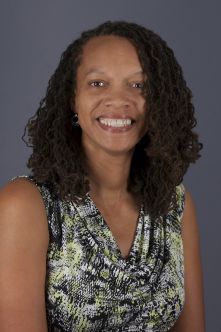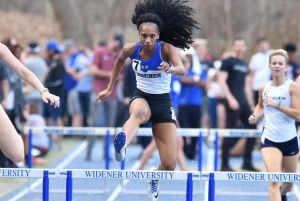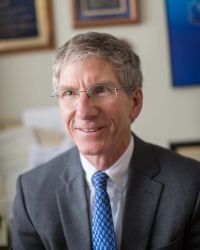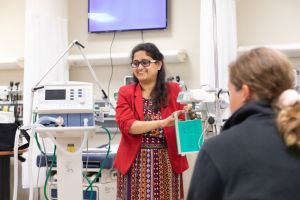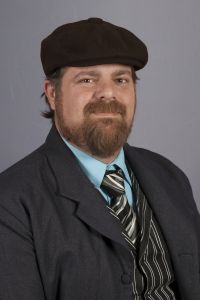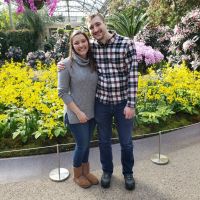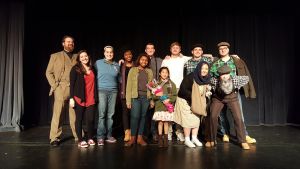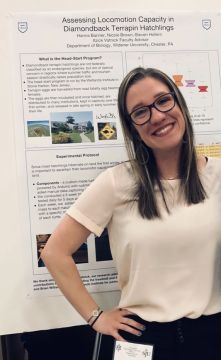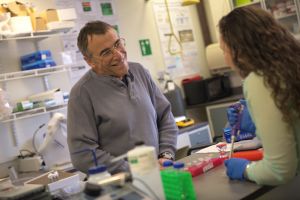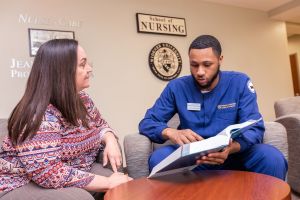The Inside Track in Action

Professor Marina Barnett—Empowering Others to Make a Difference
Marina Barnett, associate professor of social work, has been teaching and inspiring students at Widener for 18 years and has no plans to change that. Her dedication to the field of social work, the local community, and Widener students has enabled her to build bonds and inspire students to become engaged community leaders.
“I get to teach people how to help others,” Barnett said. “I want students to understand that they can make a difference. I teach policy and community organizing, and I want them to understand that they have something within themselves that can make a difference in this world.”
One student who found inspiration from Barnett’s teach-by-example model is Aishah Dukes ‘19, a criminal justice and social work graduate.
“Aishah was just a go getter. She was one of those people that I knew was going to be successful,” Barnett said of Dukes.
Dukes credits Barnett’s enthusiasm in and out of the classroom for inspiring her to pursue this path.
“Her passion for social work and for the community really influenced myself and others,” said Dukes. “She was a professor who not only would teach, but she was also doing the work while she was teaching us about the work. She was in the field and putting what we were doing in the classroom into practice.”
Dukes currently works at the Philadelphia District Attorney’s Office in the Juvenile Diversion Unit. Her role as program coordinator provides an opportunity to reroute a young person’s case from the traditional juvenile justice system and juvenile record to community-based programming.
“Aside from her influencing me during my undergrad, she was also really open to helping me by writing recommendations and figuring out what life after Widener would look like,” said Dukes.
“I actually heard from the Juvenile Diversion Unit that they had hired her, and I was just so excited,” Barnett said. “What I hope she’s gotten from me is an understanding that communities and people have strengths, and if you just work with that perspective then the job is easy.”
In addition to her emphasis on community engagement, Barnett strives to make a personal connection with her students to serve as a resource for them and help make higher education more accessible.
Dukes was very involved during her time at Widener. A member of the track and field team and a Bonner Scholar, she felt this support personally from Barnett. When Dukes was experiencing financial hardships, Barnett served as a resource for Dukes by recommending scholarship and financial aid opportunities that enabled her to continue her education.
“The research shows that when students get involved with faculty outside of the classroom, those students are more likely to persist to graduation,” Barnett said. “It’s not where you come from, it’s how you leave. And that’s what the Widener education is all about. It’s about preparing folks to take that next leap into professionalism.”
Barnett “is a leader who leads by example. After everything that has happened in the last few years, I’m happy that she’s still being a power on campus,” said Dukes.
Professor John Dernbach—Support from the Start
When John Dixon ’14 got a call from his property law professor before the start of his first semester of law school, he was surprised and didn’t know what to expect.
“I never had a professor do that before,” Dixon said. “He called students in his incoming class to introduce himself. It was obvious that he cared about making us comfortable in the challenging and often uncomfortable environment of law school.”
That call came from Widener Commonwealth Law School Professor John Dernbach—a renowned authority on environmental law, climate change, and sustainable development, and the director of the Environmental Law and Sustainability Center.
Dernbach says those types of conversations with students are daily happenings at Widener.
“All the faculty I know work to meet students where they are and be as supportive as they can,” he said. “We recognize that any given conversation with a student could impact the direction of their career and life.”
As Dixon’s interest in environmental law grew, he recalls going to Dernbach’s office often to brainstorm ideas on how to get his foot in the door and begin his career. The industry connections and insight Dernbach shared proved incredibly valuable, but the bigger takeaway was watching how Dernbach interacted with others in his network.
“As a young law student, it was good to see someone who had meaningful relationships with the people he worked with. I saw that camaraderie is important, and if you want to work well with others and accomplish things, you have to get to know them and build friendships,” Dixon said.
Currently, Dixon serves as an attorney at Saul Ewing Arnstein & Lehr LLP in Harrisburg, PA, advising clients on environmental regulations for infrastructure projects. At each step in his career, Dixon said, he checked in with Dernbach, who made him feel comfortable and confident just like with that first phone call.
Marianne Barton’s ’04 relationship with Dernbach also began before she set foot on campus. She was interested in attending Widener Law Commonwealth, but it wasn’t until she read up about the faculty and came across Dernbach that she finally committed.
“I hadn’t met him, but after seeing his body of published work, I knew I’d be happy at Widener,” she said. “He’s utterly, absolutely passionate about sustainable development. He was the deciding factor for me, for sure.”
Barton excitedly enrolled—but heading back to school for her law degree in her early 40s with five children was no easy task. She recalls sitting in class early in the semester, wondering if she really belonged and how she was ever going to get through law school.
The support she needed came just a few weeks later when Dernbach called her into his office and asked her to be his research assistant.
“That was just the beginning of a lifelong friendship,” Barton said. “We’ve supported each other professionally and personally for decades now.”
While at Widener Law Commonwealth in the early 2000s, Barton helped lead a climate change symposium that introduced topics in sustainability to many in the greater Harrisburg area for the first time. The success of that event wouldn’t have been possible, she says, without the help of Dernbach and his extensive network of environmental experts.
After graduation, this network launched Barton’s career with The Center for Climate Strategies, and later Dernbach’s reference helped her land a job at Vermont Law School.
“The greatest reward of graduating with my law degree from Widener is feeling like I have made a difference in the world,” Barton concluded.
Dernbach’s one-on-one mentorship created the space for Dixon and Barton to find their positive contributions to society and make that difference. Dernbach says that’s just the Widener Commonwealth way.
“The experience of law school can be crushing without supportive people around, especially the law faculty,” he said. “We’re all about opportunity here. Education opens doors and enables students to be impactful members of their community. But you don’t get there without a lot of help along the way.”
Professor Ria Mazumder—Teaching Outside the Classroom
On any given weekday during the semester, Ria Mazumder, assistant teaching professor of biomedical engineering, is busy leading one of her classes or student research teams in discussion. But don’t expect to find her in a classroom.
For instance, on a Tuesday afternoon in October, she and a cohort of students have ventured across campus to the nursing facilities in Founders Hall. Mazumder and her group, comprised of a senior research team and a half dozen juniors, visited the School of Nursing’s state-of-the-art Center for Simulation. There, the future biomedical engineers observed a simulation exercise and gained access to bio-instruments and nursing simulation mannequins.
This hands-on, interdisciplinary learning outside of the traditional classroom lesson, whether it be in a lab or out in the community, is one of the pillars of Mazumder’s teaching philosophy.
“One of my primary goals is to make sure that, whatever I’m teaching, my students find a practical application or use for it,” Mazumder said.
Since joining the engineering faculty in 2016, Mazumder has put into practice the belief that teaching, and by extension learning, is not bound to a classroom or lecture. Though engineering requires a strong understanding of core principles such as physics, science, and math, Mazumder’s philosophy centers around ensuring that students understand why those concepts matter and how they apply to their particular field of study.
“I like to take different avenues to get the points across. I like taking things outside the classroom,” Mazumder said. “Let’s not just do pen, paper, and PowerPoint, let’s actually go to the nursing lab.”
According to biomedical engineering graduate Emily Eisele ’22, Mazumder’s approach to infusing courses with relevant real-world applications was a turning point in her time at Widener.
“Certain lectures would lead to a lab to show us what we were learning about to help us visualize,” said Eisele.
Eisele now works as a research associate for a medical device company in California that develops instruments and hardware for spinal implants. As a biomedical engineer, Eisele explained that the immersive experiences with nursing made possible by Mazumder laid the critical groundwork to understand how closely the two disciplines interact.
“Now that I’m in the field, I’m seeing how closely we work with true clinical applications,” said Eisele. “We have representatives teach surgeons and nurses how to use our devices, so it was really important as an undergrad to understand the connection between the two fields.”
When Mazumder isn’t taking lessons to the lab, she is creating learning opportunities in the community for students like Eisele.
In her first year, Eisele was approached by Mazumder to partner together to develop STEM curriculum and an after-school program at a Chester Upland School District school. With guidance from Mazumder, Eisele led the design and delivery of lectures and hands-on activities for middle schoolers.
Eisele said the program, which was temporarily put on hiatus due to the COVID-19 pandemic, surpassed her expectations and gave her specific tools and experiences that she has carried with her into her professional career.
“It taught me how to work in a team, how to communicate, how to think from a critical perspective about what you’re doing,” said Eisele. “I feel like a lot of lessons translate outside of the context that I learned at Widener. It really prepared me as well as it could for my job.”
Professor Robert Reutter—Creating a Safe Space to Reach for the Stars
One of the first things Professor Robert Reutter did when he started at Widener in the fall of 2013 was to visit the rubble of the just-demolished building that had housed Theatre Widener. The building had originally been a beautiful church, and the brickwork was exceptional.
Standing on that historic ground and tasked with the mission of reviving a theatrical program at Widener, Reutter bent down and picked up a brick. Lone Brick Theatre was born.
In the March 12, 2022, English Suite Podcast interview, “Discovering Performance in Unlikely Places,” Reutter relates the origin story and history of Lone Brick Theatre. He says that “single brick” represented our “theatrical past but is also the foundation for our future.”
In her junior year that fall 2013, Autumn (Heisler) Demberger ’15 also remembers visiting the rubble of the Theatre Widener building. Soon after, she joined the Lone Brick crew under Director Reutter. Their first play was Distracted. Demberger was hooked.
Demberger had “never been a part of anything like that before.” She says that Reutter opened the door for the students to be involved in all aspects of the production, “from wardrobe to props to budget.”
Demberger says, “He gave everyone the opportunity to find a safe space—a creative space to grow. We were small at the start, and we felt a need to prove ourselves to the university. But Rob took on that pressure so we, the students, didn’t have to worry. We could have fun with it and focus on learning instead of worrying about university approvals.”
The following spring, they put on U.S. Drag. Demberger noted it was her favorite Lone Brick play because it enabled her to experience other perspectives in a novel way. She got to expand her role within the group with Reutter’s encouragement and support. Before they even held auditions, Reutter invited her and other students to review the script and provide input.
“Rob really let the students take the lead on a lot of character development. He gave a helping hand in the background while providing a safe space to explore and experiment,” Demberger says. “Lone Brick was small when Rob started. He grew it. Fast.”
In just a year, Reutter created a thriving, passionate, popular theatrical program on campus.
“We did Lysistrata in fall 2014, and that is when we went from a small crew to a huge production. It was so fun! Lysistrata is on YouTube. A lot of footage from our plays can be seen on Lone Brick’s Facebook page and on YouTube.” These recordings give a sense of the crew’s growth over the years.
In the spring of Demberger’s senior year, Reutter gave students opportunities to do their own show. Demberger and a few other students produced The Rocky Horror Picture Show.
Demberger says, “That was such a fun experience and incredible to be able to take the reins as co-directors and co-producers. We did everything from casting to acting to promotion. That was all our endeavor and so much fun.”
Demberger also drafted The Fate of Frank M’Kenna, Lone Brick’s first student-written production.
She attributes Reutter’s exceptional listening and observational skills as key to the students’ success. She says Reutter “really really listens. He’s quiet. He hears you. He let us get as far as we could on our own before he would offer any feedback or suggestions. We knew he was there if we needed him, but he let us do it and that was empowering.”
Demberger is currently working as the content strategist for Risk & Insurance. She says her experiences with Lone Brick have boosted her confidence to put herself out in the public eye.
Risk & Insurance hosts National Comp, the biggest workers’ comp conference in the country, every year. Demberger frequently introduces sessions for the event.
She says, “Pre-theater Autumn would not have gotten up on stage at National Comp. Being in the theater at Widener and working with Rob helped me get out of my shell. Now, getting on stage, putting myself out there, cold-calling someone for my job—it doesn’t faze me.”
Some of Demberger’s fondest memories from Widener are from being involved with the theater. She says, “It’s a community that we all got to build from the ground up. A lot of the people who I was in the theater with back then still do things with Rob today.”
Luis Aguilar ’17 was there at the start alongside Demberger, and he just performed in Reutter’s sold-out Forgotten Lore Philadelphia Fringe Festival production this past September. Aguilar will be directing a Lone Brick production this spring. Stay tuned for an upcoming Far and Widener podcast interview with Aguilar about his experiences in the theater with Reutter.
Demberger remembers Aguilar fondly and says, “The community we built is still connected and going strong. It’s exciting that Lone Brick is celebrating its 10th anniversary at Widener. That’s amazing!”
Professor Itzick Vatnick—Above and Beyond Mentorship
Hanna Banner ’20 first met Professor Itzick Vatnick while touring Widener with her father. Already admitted to the university, Banner was still torn about where to attend school.
That is until she encountered Vatnick—who teaches biology, biochemistry, and environmental science and sustainability—in the hallway of Kirkbride Hall. He approached father and daughter and offered to show them something not on the official tour. The pair followed him to his turtle lab where small terrapins were swimming in tanks under the glow of red lights.
“He gave my dad his phone number and said if we ever needed anything to call him. That really stood out to me,” recalled Banner.
Vatnick’s above-and-beyond approach and genuine friendliness that day is one of the reasons Banner committed to Widener. By her first semester as a biology major, she was already a student in his class and working in his lab, helping to care for the turtles she first encountered on her “unofficial tour.”
Vatnick would go on to become Banner’s mentor, advisor, research collaborator, colleague, and friend.
Now in his third decade of teaching at Widener, Vatnick has encountered thousands of students and mentored many in his lab, where he focuses his research on the impact of environmental pollution on aquatic ecosystems, and on the physiology and behavior of Diamondback terrapins.
Vatnick’s approach in the lab is that students do it all—carry out experiments, collect and analyze data, and find the “pieces of the puzzle to tell the story. The only way to teach science is by doing science,” he says.
Older students serve as mentors to younger ones, and, in the process, develop leadership and people skills. His students have gone on to study at top graduate programs and have pursued careers in medicine, dentistry, physical therapy, and in industry.
Banner’s post-Widener journey has been a bit different. After a fruitful four years at Widener, Banner worked as a lab assistant for Vatnick after graduation and still advises current Widener students. But she has shifted her focus somewhat.
After working in Vatnick’s lab and being inspired by his example and commitment to hands-on learning, she discovered a passion for working with college students. Today, she lives in North Dakota, where she serves as a residential director at North Dakota State College of Science.
“I don’t think I would have figured out that passion if I hadn’t worked with Dr. Vatnick,” said Banner, who has not given up on the idea of a career in the sciences, maintaining a foothold in the field.
She is weighing going back to school to become a physician assistant or possibly teaching. And she and Vatnick are in the process of publishing two papers based on their terrapin research.
As Banner figures out her next step in life, she will undoubtedly turn to Vatnick for advice. The pair speaks almost weekly. “We transitioned from professor-student to a friend relationship. I think of him as a family member I really respect,” she said.
Banner is not the only graduate who feels that way. Vatnick maintains a relationship with many of his former students, offering them advice and recommendations, serving, he says, as a soundboard for them. He’s even attended numerous alumni weddings.
When asked what makes a good teacher, the 30-year veteran professor surprisingly says “you have to work at it. You have to practice,” noting the importance of being open and empathetic.
He then adds: “You learn alongside the students. You learn from them. It’s never a one-way relationship.”
Professor Rose Rossi—Helping Students Achieve Their Full Potential
Everyone has that one person who has been an influential part of their career journey.
For alumnus Isaiah Washington ‘20, Rose Rossi, associate professor and associate dean for the School of Nursing, had the greatest impact during his undergraduate years at Widener as a nursing major.
Rossi is a valued member of the Widener community. She began teaching at Widener in 2003 in the School of Nursing. In 2008, she became the faculty advisor for the Widener University Student Nurses’ Association, also known as WUSNA. She has a passion for mentoring students and is always looking to push them to achieve their full potential.
“Sometimes all students need is a word of encouragement,” said Rossi. “Whether it’s inviting them to an event, or helping the network, it takes two seconds just to connect and reach out to someone. I always like to tell my students and let them know that I see their potential.”
She was one of the people Washington credits for helping him realize his full potential, not only as a nursing student, but also as a student leader. When he was an undergraduate student, Rossi encouraged Washington to represent the School of Nursing at the Student Nursing Convention in Pennsylvania, which was a pivotal moment in his academic career.
“I was the only guy with about 20 other women. Professor Rossi made it happen for me and encouraged me to attend. At this convention is where I realized what was out there for me and the opportunities that I had,” said Washington.
Rossi’s influence enabled him to gain the confidence he needed and pushed him to get involved. During his time at Widener, he held a position on the WUSNA e-board, was a C.R.E.W. Orientation Leader, and was part of Black Men United.
“Professor Rossi was influential in how I viewed myself,” said Washington. “She knows what her students can accomplish and is intentional about the support she gives and how she creates programs for the nursing program.”
Washington is now an operating room nurse and is currently working to obtain his master’s degree in nursing leadership and executive functioning. The leadership skills he gained at Widener have enabled him to create programs in his professional life.
“Back at Widener, I was a C.R.E.W. leader and oversaw making sure freshmen had a great transition to college. I missed that in the workforce, so I found a way to do that now,” continued Washington. “I started the nurse residency program where I am a facilitator. I am responsible for ensuring my cohort of students can transition from nursing school to nursing professional.” His work with the nurse residency program allows him to continue his passion for community and the healthcare system. In the future, he hopes to continue to be patient and community oriented.
“I am always looking for ways to help better my community, and nursing provides me with all the opportunities I am looking for to do that,” said Washington.
Washington continues to be a part of the Widener community. He currently serves as Project Pride facilitator. Project Pride is a program that was created by the School of Nursing to support nursing students from traditionally underrepresented groups at the university.
“Rossi and Widener helped me find my leadership voice and have prepared me to not only be a nurse, but also a leader. Widener is a part of me because of what it made me today,” Washington said.
Professor Alan Garfield—Rewriting the Story
For some students, mentorship mends the gap between struggling and thriving in law school.
Choosing Widener Delaware Law School was easy for Mohammed Shariff ’11: The university’s proximity to his home, a generous scholarship, an extensive industry network, and high rates of graduate employment told him this was the place to launch his career. But getting started in class proved more of a challenge.
“I didn’t know what I was getting myself into during my first semester, and I got poor grades. I wound up on academic probation and came close to ending my education right then,” he said.
In his second semester, with a lot on the line, Shariff enrolled in a contract law course with Professor Alan Garfield. Garfield is the co-founder and administrator of the Widener Delaware Law School Patent Pro Bono program, and he has won numerous accolades for his teaching, which doesn’t stop when class ends.
Shortly after the start of the semester, Shariff visited Garfield’s office to introduce himself and let his professor know that he needed help.
“I told him I was in bad shape and needed to get a high grade in his class, or I’d be out of law school,” Shariff said.
Garfield responded with direct advice—get up early and read the cases right before class so they’re fresh in your mind—as well as a big-picture look at what going through law school was going to be like.
“He made sure I knew the importance of the first few classes, because everything just keeps building on itself. He’d make us repeat what he said in class directly, which definitely drilled the basics of the curriculum into my mind,” Shariff said.
Things started clicking into place, and as Shariff started to understand how to approach contracts and cases, his GPA improved. He graduated in 2011 and began doing litigation defense casework, employing questioning that Garfield had taught him in class.
“Having that knowledge from his class gave me a major confidence boost,” he added.
Shariff also opened his own firm around this time, which deals heavily in contract law. He still runs the firm and works for Comcast NBC Universal, negotiating real estate and technology contracts.
Garfield’s contract law class helped shape the content of Shariff’s career, and Garfield’s encouragement and advice made it all possible.
“The fact that he was able to turn me, someone who was about to fail out of law school, into a lawyer who could think critically and excel in his career says enough,” Shariff concluded. “I would definitely not be where I am today without Professor Garfield’s instruction.”
For his part, Garfield finds fulfillment and purpose in being a mentor. “The truth is that I’ve had the good fortune to have such talented, industrious, enthusiastic students,” Garfield said. “It’s been a joy and a pleasure to see how they’ve flourished.”

